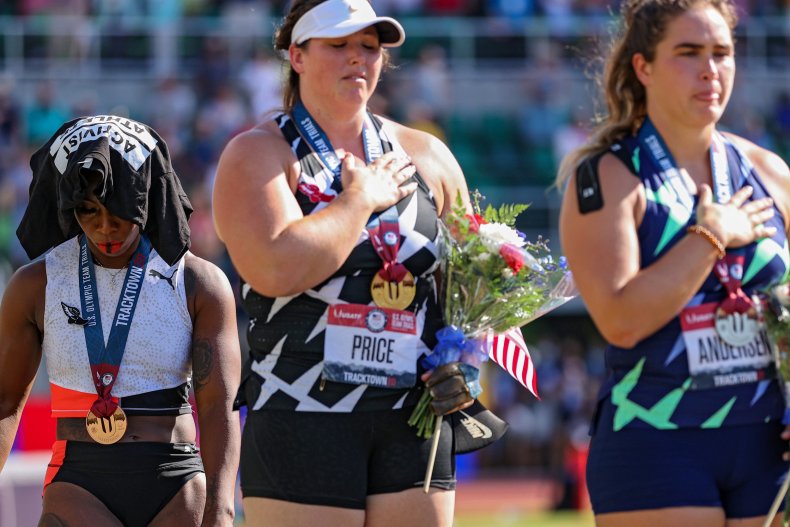Hammer Thrower Gwen Berry Turns Away From U.S. Flag, Says She Was 'Set Up'
Hammer thrower Gwen Berry turned away from the U.S. flag as the national anthem played on the penultimate day of the U.S. Olympic track and field trials.
"The Star-Spangled Banner" happened to start playing on Saturday while Berry, 31, was standing on the podium after receiving her bronze medal in the hammer throw and earning her spot at the Tokyo Olympics, the Associated Press reported.
Winner DeAnna Price and second-place finisher Brooke Andersen stood still on the podium with their hands over their hearts as the song played, but Berry put her left hand on her hip and shuffled her feet, before turning her body so she was facing the stands, rather than the flag.

Near the end of the anthem, Barry, who is Black, draped her black T-shirt, which had the words "Activist Athlete" emblazoned on the front, over her head.
Berry said she felt the timing of the anthem was not a coincidence.
"I feel like it was a set-up, and they did it on purpose," she said, according to the AP. "I was pissed, to be honest," she added.
USA Track and Field spokeswoman Susan Hazzard said "the national anthem was scheduled to play at 5:20 p.m." on Saturday. "We didn't wait until the athletes were on the podium for the hammer throw awards. The national anthem is played every day according to a previously published schedule," she added. On Saturday, the music started at 5:25 p.m.
But Berry said: "They said they were going to play it before we walked out, then they played it when we were out there."
She added that she doesn't want to discuss the national anthem "because that's not important."
"The anthem doesn't speak for me. It never has," she said, adding that her mission is to use her position to raise awareness of social injustices in the U.S.
"I'm here to represent those ... who died due to systemic racism," she said. "That's the important part. That's why I'm going. That's why I'm here today."
Price said she supported her teammate. "I think people should say whatever they want to say. I'm proud of her," she said.
Barry's gestures on Saturday comes almost two years after she raised her fist on the podium after winning gold at the Pan-Am Games in 2019, and got sanctioned. But it ultimately pushed the U.S. Olympic and Paralympic Committee (USOPC) to commit to not punishing athletes who raise their fists or kneel at the trials or in Tokyo.
The USOPC's new Council on Racial and Social Justice answered calls from athletes not to enforce its controversial Rule 50, which prohibits demonstrations at the Olympics, and notably got U.S. sprinters Tommie Smith and John Carlos sent home from the 1968 Olympic Games in Mexico City.

